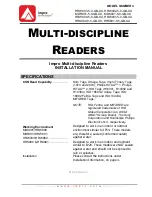
MDR300-0-0-GB-08
July 2015
Page 13
Configuring the Tag Frequency Mode
The Multi-discipline Readers offer three different Tag Frequency Modes. To select the
Tag Frequency Mode, do the following:
1. Power up the Reader. On power up, you have 5 seconds in which to set the Tag
Frequency Mode.
2. Present a Tag that matches your chosen Tag Frequency Mode:
•
Mode 1 (125 kHz): If you present a 125 kHz Tag for the full 5-second period,
the Reader will only read 125 kHz Tags.
•
Mode 2 (13.56 MHz): If you present a 13.56 MHz Tag for the full 5-second
period, the Reader will only read 13.56 MHz Tags.
•
Mode 3 (125 kHz and 13.56 MHz): If you present a 125 kHz Tag for 2
seconds followed by a 13.56 MHz Tag for 2 seconds, the Reader will read
both 125 kHz and 13.56 MHz Tags. This is the default mode.
NOTE:
If you do not present a Tag within the 5-second period, the Reader uses the
last known Tag Frequency Mode.
Setting the Output Mode (OEM Use Only)
The Multi-discipline Readers offer four different Output Mode Combinations. Select the
Output Mode by doing the following:
1. On the back of the Multi-discipline Reader, locate and bridge the two stand-alone
Pins using the 2-Way Programming Pin supplied.
2. Power up the unit, the number of beeps indicates the selected Output Mode:
•
Mode 1 (1 Beep):
26-bit, HID Normal.
•
Mode 2 (2 Beeps):
44-bit, HID Normal (Default).
•
Mode 3 (3 Beeps):
26-bit, HID Raw.
•
Mode 4 (4 Beeps):
44-bit, HID Raw.
NOTE:
The 26-bit and the 44-bit refer to the output format of EMM and Impro
Trinary Tags. HID Tags output in either normal or 45-bit raw mode.
3. Remove the 2-Way Programming Pins once the mode is selected.
4. Clip the Front Cover onto the Backing Plate.
Wiegand 44-bit Protocol
Tags are reported using Wiegand 44-bit Protocol. An “EMM” Tag has an 8-bit User
Code and a 32-bit Serial Number.
These are reported as follows:
•
The 8-bit User Code is reported in bits 1 to 8 of the Protocol.
•
The 32-bit Serial Number is reported in bits 9 to 40 of the Protocol.
•
Bits 41 to 44 of the Protocol are the exclusive OR of the preceding 40 bits taken 4
at a time.
HID Raw
In this Mode, the entire raw 45-bit HID Tag is output.
Summary of Contents for HRK900-0-5-GB Series
Page 7: ...MDR300 0 0 GB 08 July 2015 Page 7 Figure 2 Multi discipline Reader Connected to the Impro iTRT...
Page 10: ...MDR300 0 0 GB 08 July 2015 Page 10 Figure 5 Multi discipline Reader Connected to the Impro MfT...
Page 18: ...MDR300 0 0 GB 08 July 2015 Page 18 User Notes...
Page 19: ...MDR300 0 0 GB 08 July 2015 Page 19 User Notes...




















